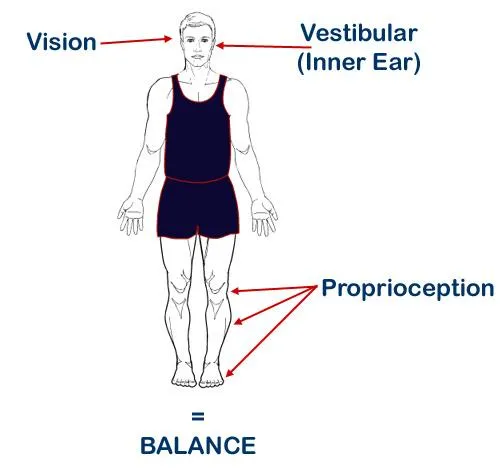19002 Park Row, Ste 203
Houston, TX 77084
Call Us: 832-684-9833
Vision Plays a Significant Role in Dizziness and Vertigo
To feel steady while walking or moving, one needs good balance
Good balance comes from the vestibular system (the name for parts of the inner ear), the visual system, and proprioceptors in the legs and feet all working together in harmony. Vision tells us where we are going and how to get there, our vestibular system keeps us upright against gravity, and our proprioceptors help us know where our body parts are so we can steady ourselves while we move.
If there is an issue with either one of those components, one's balance and feelings of steadiness will be negatively affected.
Often when a patient goes to a doctor with symptoms of vertigo or dizziness, or when they have balance problems, they will be sent to an ENT to rule out vestibular issues and they will have their cardiovascular system evaluated to rule out circulation problems. But vision is often overlooked, and is the missing piece of the puzzle.

The 3 most common diagnoses involving vision and balance / steadiness
Dizziness / disequilibrium
Often the result of a vestibulo-ocular reflex dysfunction (the reflex that coordinates eye and head movement together) and an unstable binocular system. Dizziness refers to the sensations of lightheadedness, floaty-ness, feeling not-balanced, or feeling a falling sensation and the need grab onto something to steady yourself.
Vertigo
A symptom whereby you either feel like the world is spinning around you, or you feel like you are spinning while the world is still around you. There are several different types of vertigo, and most often they are due to an issue with the inner ear and how it communicates with the two eyes.
Motion sensitivity
What happens when someone feels nauseous, anxious, and physically uncomfortable when seeing things moving in front of them, or when seeing things move around them. Neuro-optometrists often diagnose this in individuals that have experienced concussions, but it is also common in individuals whose eyes do not work well together as a team.
When the ears and the eyes are not in sync, you will not feel comfortable
When something neurological is disrupting the vestibular system and the visual system from working together in harmony, it is similar to what happens when watching a tv show or movie and the sound and picture are out of sync. In this analogy both the sound and the picture work; you can hear everything clearly (when you close your eyes) and there is nothing wrong with the quality of the image you see (when you turn the volume off). But together, since the timing is off and the sound does not move with the actors' mouths properly, you have a dramatically negative reaction to this.
Fortunately, when this is properly diagnosed and treatment is given for both the visual and vestibular systems, the systems can be synced back together! A neuro-optometric examination can diagnose this condition, and then treatment involves the combined use of prism lenses, colored tints, occlusion foils placed over parts of a lens, and skilled vision therapy.
After successful treatment, you no longer suffer from the debilitating symptoms of dizziness / disequilibrium, vertigo, and motion sensitivity.
Video discussing motion sickness and vision
Signs when dizziness / vertigo includes a vision problem
Feeling off-balance and "floaty"
Feeling like you are spinning when walking
Feeling like the world is spinning even while you are still
Motion sickness
What looks straight ahead isn’t always straight ahead
Lack of confidence when walking, stumbling
Difficulty judging the distance to different things
Side vision is distorted
Notices objects moving or changing position
Can’t tolerate “visually-busy” places
Motion on the sides elicits feelings of discomfort / unease / nausea
Anxiety while driving, sense of "panic" while driving due to movement of cars and their distances around you
What is used to treat these conditions:
Therapeutic Glasses

These may be prism lenses or plus-powered lenses. Prism lenses move light to a position most comfortable for the eyes, and plus-powered lenses reduce the strain and effort required to focus to see anything up close.
Tinted Lenses

These are colored lenses prescribed for wear throughout your day, and they can help reduce visual symptoms, evoked by stress or trauma, that can often overwhelm the body.
Vision Rehabilitation

A customized therapy program, often recommended in conjunction with therapeutic lenses and syntonic light therapy, that rebalances the visual system and helps correct underlying binocular vision dysfunctions
If you are suffering from this, contact us today.
We can help you to feel comfortable again to do the things that you used to do: going to large stores, walking through a crowd, traveling to visit friends and family. You don't need to suffer any longer.
Contact Details
Texas Vision Therapy
19002 Park Row Suite 203
Houston, TX 77084
Phone: 832-684-9833
Fax: 346-352-9156
Office Hours
Monday through Thursday:
9:00 AM - 6:00 PM
Friday to Sunday:
Closed

